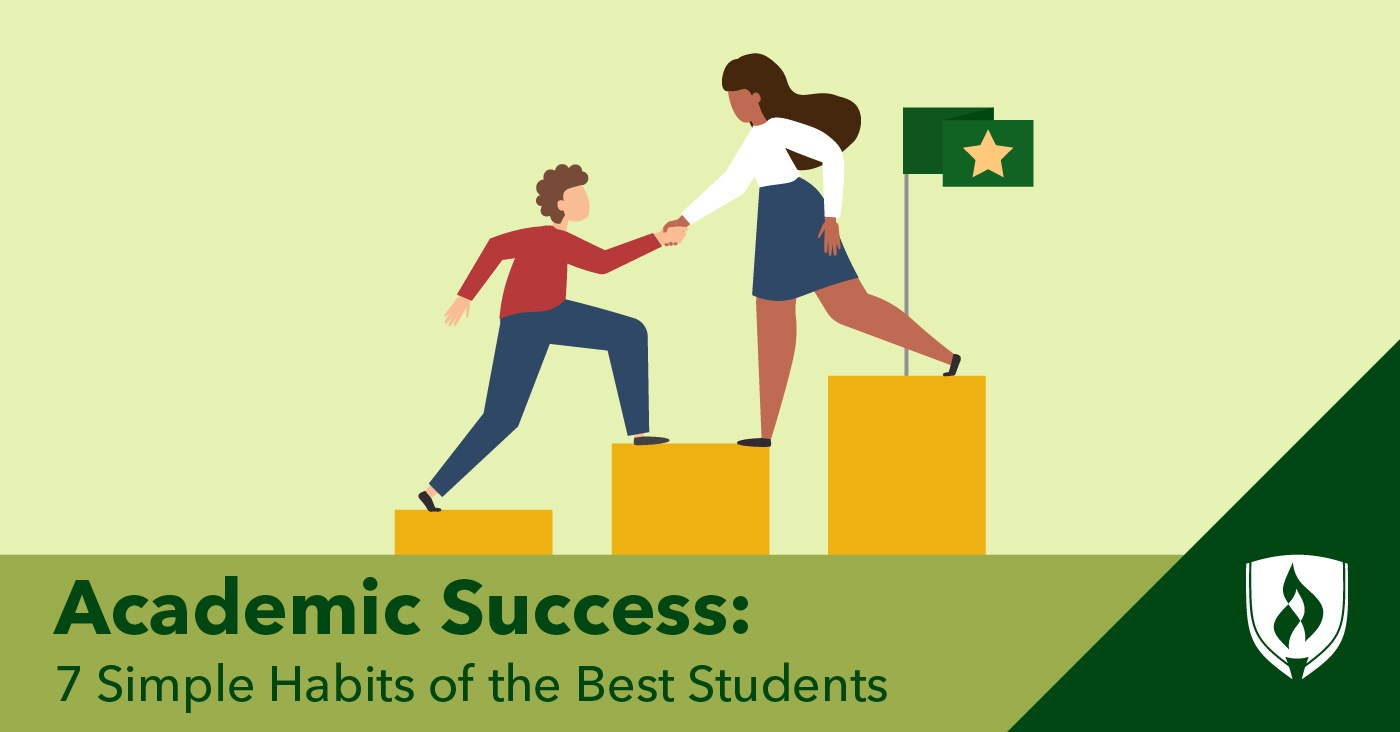
While going back to school to earn a degree is an exciting prospect, it can also be nerve-racking—particularly if you don’t know what to expect. You might have questions about what college classes are like. Or maybe you’re worried about how you’re going to balance all of the work, family and school responsibilities that may be pulling you in multiple directions.
If you’re feeling a little anxious about how returning to school will go, take a deep breath and settle in because we’re here to help. While there’s no magic formula for guaranteed success, there are plenty of seemingly small things you can get into the habit of doing that can provide a big lift.
In this article, we’ve compiled some of the tried-and-true tactics used by successful Rasmussen University students and peer tutors to keep on top of their studies. Examining these habits can help you develop your own plan for academic success.
7 Academic success tips the best students stick to
Academic success after making the move to college coursework isn’t something you should take lightly—but remember, it is achievable. We’ve asked Rasmussen University Learning Services Coordinator Bonnie Ostrand to offer insight into the tactics and strategies the team of peer tutors she oversees recommend to others—and use in their own studies!
1. Set aside a regular time for coursework
Organizing your schedule is really a key part of making classwork and studying natural parts of your life. Leather-bound planners, wall calendars, phone apps—whatever works best for you is a good bet. Ostrand cites the notetaking and organizational tool OneNote® as being commonly used by successful students.
“But it could be any organizational system,” Ostrand adds. “Planners, bullet journals, spreadsheets, pen and paper, anything that the student responds to that allows them to plan and track their success.”
Your personality also comes into play with study habits. Are you a night owl or a morning person? Do you need quiet, distraction-free space, or does your brain come alive in a laundromat while listening to music? There is no right method—just what’s right for you as an individual.
“Start the week by reviewing the agenda for each course,” Ostrand recommends, adding that a brief review of each assignment helps give students a sense of the time commitment involved.
Another tip that the many of Ostrand’s peer tutors suggest?
“Avoid procrastinating,” Ostrand adds. “The best way is to start small so you aren’t overwhelmed.”
Every little bit helps—would you rather approach a paper’s due date with nothing done or with an outline and a few good source citations ready to roll? Try to find the little things you can get crossed off of your to-do list during busier times of the week if at all possible.
2. Space out studying instead of “cramming”
Cramming is a lot like binge-watching. But while staying up late with a new streaming series can be really fun, all-nighter cram sessions are not only unpleasant but can also be counterproductive. Research shows that getting a good night’s proper sleep is more effective on test scores than a last-minute effort to absorb all the class material. Cramming puts the burden on the short-term memory, which doesn’t always result in full absorption into your long-term memory.
As Ostrand sees it, the problem with cramming is two-fold.
“Cramming leads to stress and anxiety as cramming is in and of itself a stressful, time-bound practice,” Ostrander explains. “When stressed, we are unable to cognitively retain as much information.”
3. Use library resources
As a student at Rasmussen University, you have access to a wealth of library and learning resources. The Library and Learning Services team offers live chats with librarians, as well as webinars on topics like time management and test-taking skills, in addition to help with online library research and technical skills, like citation formatting. Taking advantage of these resources from the start will help you throughout your educational path. A good place to start is the Student Success Guide found here.
4. Don’t avoid asking instructors for help
Many students do not approach instructors when they need help or have questions about a subject. Their reasons vary from feeling shy about asking what they think might be “dumb” questions, feeling vulnerable and judged, and worrying they are bothering instructors. If you take a step back from those personal feelings and look at the big picture, it’s really a little bit silly—your instructors want you to be successful, so don’t talk yourself out of making contact.
“Don’t be afraid to reach out to instructors,” Ostrand advises. “If you have questions, most likely other students do too!”
Keep in mind: Your instructors want to know if students need help with the coursework as this is by definition their jobs. Asking questions shows your engagement and interest in the material—something any teacher appreciates. One of the best things you can do as a student is to shake any hesitancy you might have about reaching out to your instructors; your success is a reflection on their teaching abilities.
5. Find a study buddy
Not only is studying with others a way to add some fun, but it also can keep you accountable. If you know someone else is expecting to meet up at a coffee shop or log in to a videoconference meeting, this reinforces that your coursework is a priority as well as something enjoyable. And if your study buddy is in the same class, you can also share tips and resources with each other, helping each other succeed. Study partners also remind you that you’re not alone, and if you’re struggling, they can support and encourage you.
Ostrand encourages students to seek out peer tutors.
“Even if it’s just to get a second opinion,” she suggests. “It’s a great way to connect with other students in the program, as well as get support.” You can learn more about getting started with the peer tutoring program at Rasmussen University here.
6. Plan ahead, and set reminders
A big part of prioritizing your work is making plans and reminders that certain assignments need to be finished or tests require preparation ahead of time. These reminders aren’t just for you, either; it’s good to let friends and family know that you’ll be busy with classwork and studying as well.
“Setting boundaries with family members around study times can help you stay focused and get the time you need,” Ostrand explains.
At the beginning of each term, scanning your class syllabus and entering all the key deadlines and test dates is a terrific way to map out what’s ahead—for you and those in your life. Ostrand says the peer tutors she supervises also recommend setting timers for short study sessions. Committing to short sessions—reading in 20-minute increments, for example—helps you stay on track and chip away at larger assignments.
7. Build connections wherever possible
It might seem a little counterintuitive to add getting more involved with academic-related activities to what may already be a busy schedule, but these connections can help you stay motivated to remain on track.
Are there groups affiliated with your program? Volunteer opportunities that you’re passionate about? Campus events that sound like a good time? Investing time in these school activities not only lets you meet people with similar interests, but it’s also another way to create a community of colleagues to form your network after you’ve graduated. Social connections— causes, projects and extracurricular events— are wonderful motivators to keep you focused on school while having fun too.
Not sure where to start? Ostrand recommends seeking out work study positions as an excellent way to stay connected academically and stresses that staying in touch with your advisor is also beneficial. “Advisors are great resources for degree-related questions,” Ostrand says.
You can do it
Don’t let academic doubts be what holds you back from completing a life-changing education. While it will certainly be an adjustment, you are capable of academic success in college—and Rasmussen University will be there to help when the inevitable challenge comes up.
Want to learn more about the resources available to you at Rasmussen University? Check out our article “9 Surprising Student Resources You Didn’t Know Rasmussen University Offered.”
Microsoft OneNote is a registered trademark of Microsoft Corporation.




